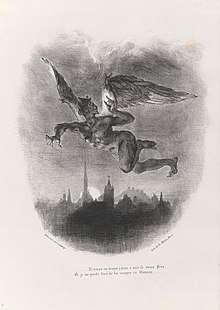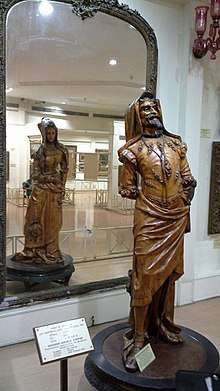Mephistopheles
Mephistopheles (/ˌmɛfɪˈstɒfɪˌliːz/, German pronunciation: [mefɪˈstoːfɛlɛs]; also Mephistophilus, Mephostopheles, Mephistophilis, Mephisto, Mephastophilis, and other variants) is a demon featured in German folklore. He originally appeared in literature as the demon in the Faust legend, and he has since appeared in other works as a stock character (see: Mephistopheles in the arts and popular culture).

Etymology

Traditional scholars of Germanic mythology commonly use the spelling "Mephistopholes," based on a transliteral understanding of the 15th century spelling of the character . The word may derive from the Hebrew מֵפִיץ (mêp̄îṣ) which means "scatterer, disperser", and tophel, short for ט֫פֶל שֶׁ֫קֶר (tōp̄el šeqer) which means "plasterer of lies".[1] The name can also be a combination of three Greek words: μή (mḗ) as a negation, φῶς (phō̃s) meaning "light", and φιλις "philis" meaning "loving", making it mean "not-light-loving", possibly parodying the Latin "Lucifer" or "light-bearer".[2][3]
Inside the Faust legend

The name Mephistopheles is associated with the Faust legend of an ambitious scholar, based on the historical Johann Georg Faust. In the legend, Faust makes a deal with the Devil at the price of his soul, Mephistopheles acting as the Devil's agent.
The name appears in the late-16th-century Faust chapbooks- stories concerning the life of Johann Georg Faust, written by an anonymous German author.
In the 1725 version, which Goethe read, Mephostophiles is a devil in the form of a greyfriar summoned by Faust in a wood outside Wittenberg.
From the chapbooks, the name entered Faustian literature. Many authors have used it, from Christopher Marlowe to Goethe. In the 1616 edition of Marlowe's The Tragical History of Doctor Faustus, Mephostophiles became Mephistophilis.
Mephistopheles in later treatments of the Faust material frequently figures as a title character: in Meyer Lutz' Mephistopheles, or Faust and Marguerite (1855), Arrigo Boito's Mefistofele (1868), Klaus Mann's Mephisto, and Franz Liszt's Mephisto Waltzes. There are also many parallels with the character of Mephistopheles and the character Lord Henry Wotton in The Picture of Dorian Gray by Oscar Wilde.[4]
Interpretations
_by_shakko_09.jpg)
Although Mephistopheles appears to Faustus as a demon – a worker for Lucifer – critics claim that he does not search for men to corrupt, but comes to serve and ultimately collect the souls of those who are already damned. Farnham explains, "Nor does Mephistophiles first appear to Faustus as a devil who walks up and down on earth to tempt and corrupt any man encountered. He appears because he senses in Faustus' magical summons that Faustus is already corrupt, that indeed he is already 'in danger to be damned'."[5]
Mephistopheles is already trapped in his own Hell by serving the Devil. He warns Faustus of the choice he is making by "selling his soul" to the devil: "Mephistophilis, an agent of Lucifer, appears and at first advises Faust not to forgo the promise of heaven to pursue his goals".[6] Farnham adds to his theory, "...[Faustus] enters an ever-present private hell like that of Mephistophiles".[7]
Outside the Faust legend
Shakespeare mentions "Mephistophilus" in the Merry Wives of Windsor (Act I, Scene I, line 128), and by the 17th century the name became independent of the Faust legend. According to Burton Russell,[8] "That the name is a purely modern invention of uncertain origins makes it an elegant symbol of the modern Devil with his many novel and diverse forms".
Mephistopheles is also featured as the lead antagonist in Goethe's Faust, and in the unpublished scenarios for die Walpurgis-Nacht (German for "the Walpurgis-Night"), he and Satan appear as two separate characters.
References
Bibliography
- Russell, Jeffrey Burton (1986). Mephistopheles: The Devil in the Modern World (1990 reprint ed.). Ithaca, New York: Cornell. ISBN 978-0-8014-9718-6.
- Goethe, Johann Wolfgang Von (2001). Hamlin, Cyrus (ed.). Faust: A Tragedy ; Interpretive Notes, Contexts, Modern Criticism (Norton Critical ed.). New York, New York: W. W. Norton & Company. ISBN 978-0-393-97282-5.
- Ruickbie, Leo (2009). Faustus: The Life and Times of a Renaissance Magician. Stroud, UK: History Press. ISBN 978-0-7509-5090-9.
Notes
- Online Etymology Dictionary. "Mephistopheles". Dictionary.com. Retrieved December 11, 2015.
- von Goethe, Johann Wolfgang (March 14, 2016). "The Tragical History of Doctor Faustus" (PDF). In Black, Joseph; Conolly, Leonard; Flint, Kate (eds.). The Broadview Anthology of British Literature Volume 2: The Renaissance and Early Seventeenth Century, Second Edition (3rd ed.). Peterborough, Ontario, Canada: Broadview Press. p. 423. ISBN 978-1-55481-028-4.
- Lewis, James R. (2001). Satanism Today (PDF). Santa Barbara, California: ABC-CLIO. p. 173. ISBN 978-1576072929.
- https://warwick.ac.uk/fac/arts/english/currentstudents/undergraduate/modules/fulllist/special/interdisciplinaryandcreativecollaboration/faustbooks/doriangray/
- Farnham, Willard (1969). Twentieth Century Interpretations of Doctor Faustus. Upper Saddle River, New Jersey: Prentice-Hall.
- Krstovic, J. O. and Lazzardi, Marie. "Plot and Major Themes". Rpt. in Literature Criticism from 1400 to 1800. Ed. Jelena O. Krstovic and Marie Lazzardi. Vol. 47. Farming Mills, MI: The Gale Group, 1999: 202
- Krstovic & Lazzardi 1999, p. 8
- Burton Russell 1992, p. 61
External links
| Wikisource has the text of the 1911 Encyclopædia Britannica article Mephistopheles. |

